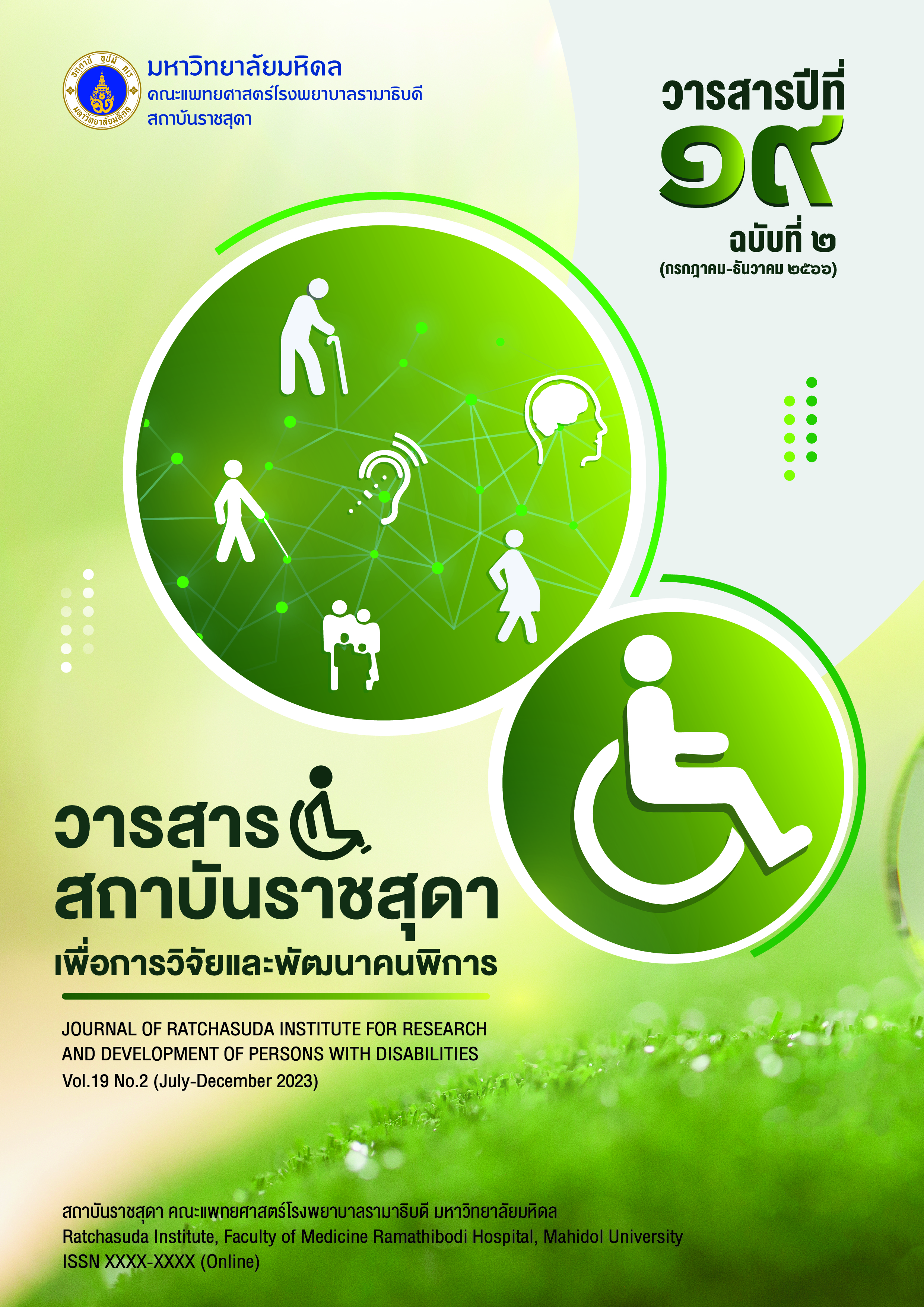Effect of Orff-Based Music Therapy Interventions on Social Skills for the Older Persons
Keywords:
Older persons, Orff-Based Music Therapy, Social SkillsAbstract
The purpose of this study was to compare the level of the older person’s social skills between pre-, mid-, and post- Orff-based music therapy intervention with a quasi-experiment one group repeated-measures design. The sample were 10 older persons from McKean Senior Center, Chiang Mai, Thailand. All samples attended 12 group music therapy sessions, 45 minutes per session, for six weeks. Orff-based music therapy intervention consisted of five activities: 1) greeting activities, 2) rhythmic activities, 3) group singing, 4) group instrument playing, and 5) goodbye activities. Research instruments used in this study were: 1) general background questionnaire, 2) The Individualized Music Therapy Assessment Profile (IMTAP) in Social Domain, and 3) observation form. Repeated-measure ANOVA was used to analyze the average of social skills among pre-, mid-, and post- interventions and content analysis was used to analyze the data from observation. The result revealed that Orff-based music therapy intervention can improve social skills in the older persons. According to the social skills averages in each item, there were significantly increased in 11 out of 12 items at the level of .05. For the overall score of social skills, the post-test scores were significantly higher than the pre- and mid-test scores at the level of .05.
Downloads
References
American Orff-Schulwerk Association. (2021). More on Orff Schulwerk. https://aosa.org/about/more-on-orff-schulwerk/?fbclid=IwAR3lb5EZikXVgRAdVkp6lo3dYERNFUWnSUwTx6Aw-opoWQ75htkiM3uTlRI.
Darrow, A. A. (2008). Introduction to Approaches in Music Therapy (2nd ed.). American Music Therapy Association.
Davis, W. B., Gfeller, K. E., & Thaut, M. (2008). An introduction to music therapy: Theory and practice. American Music Therapy Association.
Department of Mental Health. (2015). Guidelines for psychological social care of the elderly to prevent health problems (4th edition). Division of Mental Health Promotion and Development.
Dezfoolian, L., Zarei, M., Ashayeri, H., & Looyeh, M.Y. (2013). A Pilot Study on the Effects of Orff-Based Therapeutic Music in Children with Autism Spectrum Disorder. Music and Medicine, 5, 162-168.
Ghasemtabar, S. N., Hosseini, M., Fayyaz, I., Arab, S., Naghashian, H., & Poudineh, Z. (2015). Music therapy: An effective approach in improving social skills of children with autism. Advanced biomedical research, 4, 157. https://doi.org/10.4103/2277-9175.161584
González-Ojea, M. J., Domínguez-Lloria, S., & Pino-Juste, M. (2022). Can music therapy improve the quality of life of institutionalized elderly people? Healthcare, 10(2), 310. https://doi.org/10.3390/healthcare10020310
Kayili, G., & Kuşcu, Ö. (2020). The effects of Orff-based attention-enhancing music education programme on impulsive preschool children’s cognitive tempo. Early Child Development and Care, 190(3), 390–399.
Mathew, D., Sundar, S., Subramaniam, E., & Parmar, P.N. (2017). Music therapy as group singing improves Geriatric Depression Scale score and loneliness in institutionalized geriatric adults with mild depression: A randomized controlled study. International Journal of Educational and Psychological Researches, 3(1), 6-10.
Mey, S. C. (2013). Music Therapy: An Approach Used To Train Children with Autism Spectrum Disorder. International Journal of Child Development and Mental Health, 1(1), 57–73. https://he01.tci-thaijo.org/index.php/cdmh/article/view/67056
Nawsuwan, K., & Suwanraj, M. (2019). Current Problems and Care Needs of Older Adults Living in Local Administrative Organization Responsibility Area in the Lower Southern of Thailand. Boromarajonani College of Nursing, Uttaradit Journal, 11(2), 118-132.
Panich, R. (2021). The Enhancing Aesthetics for building Self-esteem in Elderly People. Humanities and Social Sciences Review, 9(3), 28-39.
Pasiali, V., & Clark, C. (2018). Evaluation of a Music Therapy Social Skills Development Program for Youth with Limited Resources. Journal of music therapy, 55(3), 280–308. https://doi.org/10.1093/jmt/thy007
Ramey, M. (2011). Group music activities for adults with intellectual and developmental disabilities. Jessica Kingsley Publishers.
Schumacher, K. (2013). The importance of Orff Schulwerk for musical social-integrative pedagogy and music therapy. Approaches: Music Therapy & Special Music Education, Special Issue 5(2), 113-118.
Ueda, T., Suzukamo, Y., Sato, M., & Izumi, S. (2013). Effects of music therapy on behavioral and psychological symptoms of dementia: a systematic review and meta-analysis. Ageing research reviews, 12(2), 628–641.
Voigt, M. (2013). Orff Music Therapy: History, principles and further development. Approaches: Music Therapy & Special Music Education, Special Issue 5(2), 97-105.
Werner, J., Wosch, T., & Gold, C. (2017). Effectiveness of group music therapy versus recreational group singing for depressive symptoms of elderly nursing home residents: pragmatic trial. Aging & mental health, 21(2), 147–155.
Wheeler, B. L. (2015). Music Therapy Handbook. The Guilford Press.
World Federation of Music Therapy. (2011). What is music therapy. http://www.wfmt.info/WFMT/President_presents..._files/President%20presents...5-2011.pdf
Zanini, C. R. de O., & Leao, E. (2006). Therapeutic Choir - A Music Therapist Looks at the New Millenium Elderly. Voices: A World Forum for Music Therapy, 6(2). https://doi.org/10.15845/voices.v6i2.249
Downloads
Published
How to Cite
Issue
Section
License
Copyright (c) 2023 Journal Of Ratchasuda Institute for Research and Development of Persons With Disabilities

This work is licensed under a Creative Commons Attribution-NonCommercial-NoDerivatives 4.0 International License.
บทความที่ได้รับการตีพิมพ์เป็นลิขสิทธิ์ของวารสารสถาบันราชสุดาเพื่อการวิจัยและพัฒนาคนพิการ






